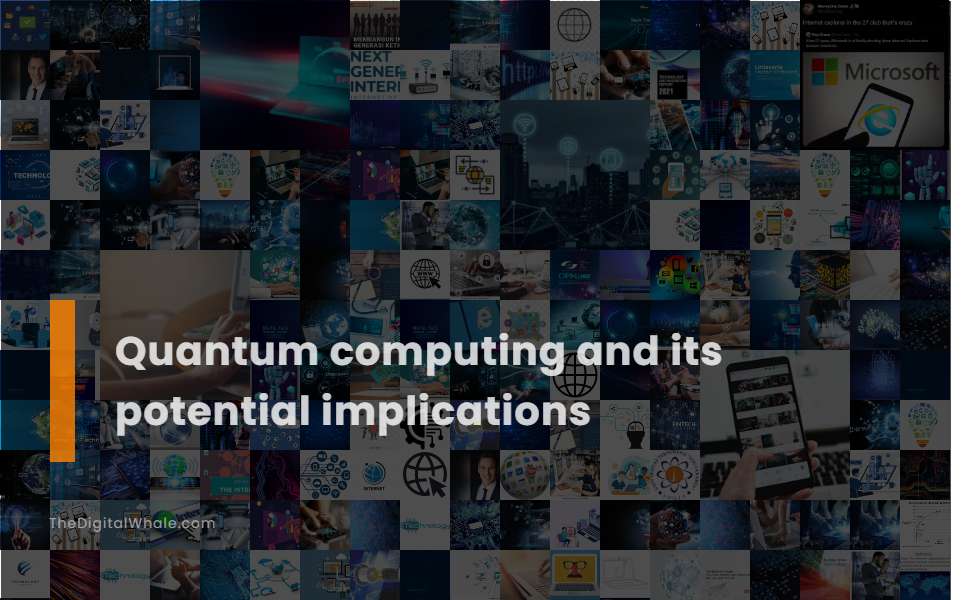Quantum Computing and Its Potential Implications
What will be the most important impact of quantum computing on finance? What are the potential implications of quantum computing on healthcare? Let's find out more about Quantum Computing and Its Potential Implications.

Qubits and Superposition
Qubits in Quantum Computing can exist in a state of superposition, meaning they can be in a state of 0, 1, or both 0 and 1 simultaneously, allowing for parallel processing and exponentially increased computational power. This feature, combined with entanglement, enables Quantum Computers to perform complex calculations much faster than classical computers.
Entanglement
Entanglement in quantum computing is a fundamental concept where two or more quantum systems become correlated, allowing their states to be instantaneously affected regardless of distance. This phenomenon enables Quantum Computers to perform multiple calculations simultaneously, exponentially increasing their processing power, and is crucial for protocols like quantum teleportation and quantum error correction.
Quantum Gates and Circuits
Quantum gates and circuits are fundamental components of Quantum Computing, with the set of single-qubit gates and the CNOT gate being universal, meaning any unitary gate acting on an n-qubit register can be implemented using these gates. These gates can be combined to form complex quantum circuits, including controlled-U gates and multi-qubit operations, which are essential for performing quantum computations. For more in-depth information, you can refer to the comprehensive resource on Quantum Computing principles and methodologies.
Quantum Measurement
Quantum measurement in the context of measurement-based quantum computing involves making sequential measurements on entangled qubits in a cluster state, with each measurement determined by the outcome of the previous one. This approach allows the implementation of any quantum gate or circuit without the precise fabrication and tuning of qubits required in gate-based systems. Unlike classical measurements, Quantum Measurements are probabilistically reversible, minimally disturbing, and capable of occurring over time. This is crucial for accurately capturing the behavior of quantum systems without causing significant disturbances. Advancements such as quantum-limited amplifiers further enhance the accuracy and reliability of these quantum measurements.
Quantum Algorithms (e.g., Shor's and Grover's)
Grover's Algorithm and Shor's Algorithm are pivotal in Quantum Computing, with Grover's Algorithm enabling efficient unstructured search using \(O(\sqrt{N})\) evaluations. Meanwhile, Shor's Algorithm provides an exponential speedup for factoring large composite numbers through the Quantum Fourier Transform and Quantum Phase Estimation. For further insight into these groundbreaking advancements, you can explore more about Grover's Algorithm and how it revolutionizes computational capabilities in the quantum realm.
Related:
What are three ways that online reputation influences Learners' decisions? What is the role of digital identity in the world of fake news and misinformation? Let's find out more about Managing Digital Identities and Online Reputations.
Quantum Error Correction
Quantum Error Correction is a technique that protects quantum information by encoding it into a larger set of qubits, called physical qubits, which represent a logical qubit. This redundancy allows for the detection and correction of errors caused by decoherence and imperfections in quantum gates, ensuring the integrity of the quantum information. To delve deeper into this intricate process, the Microsoft Quantum Documentation offers comprehensive insights and guidance, making it an invaluable resource for understanding how quantum error correction maintains the fidelity of quantum computations.
Decoherence
Decoherence in Quantum Computing is the phenomenon where a quantum system loses its quantum behavior due to interactions with its environment, causing the loss of superposition and entanglement properties. This is a major challenge that must be mitigated through techniques like quantum error correction and dynamical decoupling to ensure reliable quantum operations. For a deeper understanding of this key concept, visit the Quantum Decoherence page. These techniques are crucial for maintaining the integrity of quantum computations in practical applications.
Quantum Parallelism
Quantum parallelism in Quantum Computing arises from the superposition of quantum states, allowing quantum systems to explore and process multiple computational paths simultaneously through unitary transformations. By leveraging principles such as interference and entanglement, these systems achieve exponential increases in computational power and efficiency. To delve deeper into this fascinating topic, you can explore more on the ArXiv website.
Optimization and Machine Learning Applications
Quantum computing has the potential to significantly enhance optimization and machine learning applications by leveraging its unique computational properties, such as quantum parallelism and the ability to solve certain linear algebra problems exponentially faster than classical computers. This can lead to faster and more efficient training of machine learning models, improved data processing in tasks like natural language processing and image recognition, and enhanced optimization in problems like the traveling salesman problem and portfolio optimization. For more insights into the future possibilities of these technologies, explore the Supercharging AI with Quantum Computing.
National Security and Cryptography Implications
Quantum computing poses significant threats to National Security by enabling the breaking of traditional encryption methods, particularly asymmetric cryptography, through algorithms like Shor's Algorithm, which could decrypt sensitive data in minutes, compromising communications, financial transactions, and the security of national secrets. The advent of powerful quantum computers risks breaking much of the current cryptography, especially asymmetric algorithms, necessitating a migration to Quantum-Resistant Cryptographic Algorithms to protect the long-term confidentiality of sensitive data, such as customer passwords, healthcare data, and national security information.
Related:
What is the effects of technology on loneliness and social isolation? Has technology made us less lonely? Let's find out more about The Role of Technology In Promoting Or Combating Loneliness.
